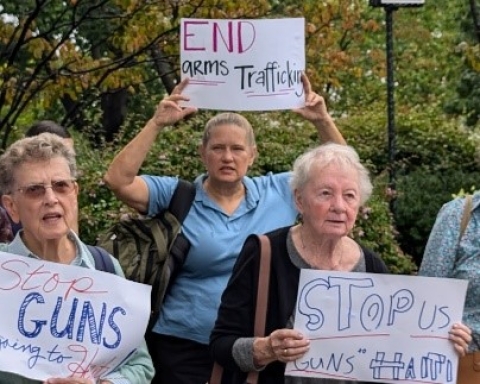
More than 40 organizations working for peace and justice in Haiti came to Washington, DC for Haiti Advocacy Days.
The following article was published in the November-December 2024 issue of NewsNotes.
More than 40 organizations working for peace and justice in Haiti came to Washington, DC for Haiti Advocacy Days on September 25-26 to meet with members of Congress and their staff about the urgent crisis of illegal guns and ammunition flowing from the United States to gangs in Haiti.
Maryknoll lay missioner Sami Scott, recently evacuated from Haiti, joined the broad coalition of faith leaders and their partners who met with 15 Senate offices and delivered their letter of concern and call to action to additional congressional offices. At the heart of their message was the human face of Haiti’s descent into chaos and lawlessness under the rule of armed gangs. Sami described the tightening grip of heavily armed gangs on communities as “unrelenting terror” that has made all forms of work, schooling, and daily activities nearly impossible for the Haitian people.
The presence of the Kenya-led Multinational Security Support (MSS) in Haiti since June has made little impact in public safety. The Head of the UN Integrated Office in Haiti (BINUH) María Isabel Salvador reported 1,441 murders from June to August, a 40% increase during the same period in 2023. The UN Secretary General has described Haiti’s situation as “one of the most disastrous humanitarian situations in the whole world.” Recently Kenya’s President Ruto promised to send 600 more troops to Haiti in November 2024.
The U.S. had proposed transforming the MSS into a UN Peacemaking Mission, but they subsequently dropped it in September. Many countries, including China and Russia, had expressed their distaste for a UN Peacekeeping Mission. Nonetheless, the UN renewed the MSS mandate for a year.
The rationale for wanting to transform it into a UN Mission was to ensure stable funding from member states. Currently, MSS is funded by the United States and Canada. Leslie Voltaire, the current rotating president of Haiti’s Transition Presidential Council sent a letter to the UN Secretary General asking that the MSS be transformed to a UN Mission.
In October 2022, the UN passed a one-year regime of sanctions comprised of targeted assets freeze, travel ban and arms embargo. The sanctions have been renewed by the UN Sanctions Committee which expanded the arms embargo from targeted measures applying to designated people to include a territorial embargo covering the entire country.
Photo of Sami Scott at the Washington, DC, Haiti Advocacy Days by Dan Moriarty.
